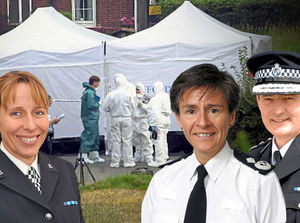Will there ever be justice over Kevin Nunes murder?
It has all the ingredients of a TV police drama.

Drug dealers, murder, and an alleged cover-up by senior officers.
There are also doses of sex, dodgy detectives, and an unscrupulous star witness for good measure.
For 15 years the gangland killing of Kevin Nunes has never been far from the headlines – but its narrative is very much reality.
Today the police watchdog published its findings into the scandal that saw five men convicted of the gangland slaying and then sensationally cleared, after a series of shocking police failings.
Nunes, 20, was an amateur footballer who played for Stafford Rangers and had been on the books of Tottenham Hotspur.
He had strayed into the Wolverhampton drug scene and the lucrative Aberdeen cocaine run.
That would be a massive mistake.
On September 19, 2002, his body was found in a country lane in Pattingham, Staffordshire. He had been shot five times.
Police said he had been taken out by rival Black Country drug mobs, the Heath Town Gang and the West Bromwich-based Raiders.
In 2008, five Black Country gangsters Adam Joof of Willenhall, Levi Walker of Birmingham, Antonio Christie of Great Bridge, and Owen Crooks and Michael Osbourne both of Wolverhampton were given life sentences after being found guilty of the 20-year-old's murder at Leicester Crown Court.
But four years later the five men had their convictions quashed in the Court of Appeal.
The court revealed serious police failings and concerns over the case had not been disclosed at the original murder trial.
A damning internal police management review, which looked into wrongdoing by detectives and the handling of the case's star witness, was never revealed to the judge, jury or barristers.
Had it been it would have cast serious doubt on the integrity of the police's case.
It exposed that detectives drunk alcohol with the star witness, covered-up alleged crimes committed by the witness, and that they allegedly abused overtime to boost their pay.
One of the witness handlers was having an ‘intimate affair’ with the female officer in charge of overseeing evidence at the witness's 'safe house'.
But overall the dossier revealed the unit was dysfunctional. Detectives didn’t trust each other, and there were major concerns over the integrity of some of the officers.
It sparked a major inquiry by the police watchdog. A total of 14 former and serving Staffordshire officers were investigated, including Jane Sawyers, then-Chief Constable at Staffordshire; Adrian Lee, then-Chief Constable at Northamptonshire; Suzette Davenport, then-Chief Constable at Gloucestershire, and Marcus Beale, Assistant Chief Constable at West Midlands Police.
The scandal was exposed by ex-Detective Inspector Joe Anderson who turned whistleblower in the case.
He had warned senior police bosses there was an 'at all costs' attitude to securing convictions in the case – but little was done.
The role of the star witness, Simeon Taylor, was crucial.
An Express & Star investigation found that Taylor, who was on the witness protection scheme and claimed to be present when Mr Nunes was shot dead, caused damage worth £6,494.63 to a safe house in Wales – two years before the now discredited murder trial started.
Staffordshire Police paid the amount in repairs, replacement of missing items and compensation to the landlord after the property was trashed. The landlord also used a £700 bond paid by the police on the property, bringing the total to more than £7,000.
Taylor also stole £320 of police funds from a hotel he was staying at for his protection.
Police treated him to trips to South Africa, they bought him gifts, and it is now known he received a £15,000 reward.
We now know Taylor breached the terms of his protection status a staggering 76 times – but he was still allowed to give evidence.
But none of this was ever known to the original court case.
In the Court of Appeal, Lord Justice Hooper said: "If, as should have happened, DI Anderson's ability to give evidence about the Sensitive Policing Unit had been disclosed, the information which DI Anderson was to give to the investigation would have been available then it may well be that the prosecution would not have proceeded with the trial, or the judge would have stopped the proceedings on the grounds that there had been gross prosecutorial misbehaviour." He added: "This was a very bad case of non-disclosure."
This year Walker and Christie were paid £200,000 in damages by Staffordshire Police.
It has taken the Independent Police Complaints Commission nearly three years to publish its full findings into this saga.
But even though some of the country's most senior police officers were found to have failed in their duties, none of them will face any disciplinary action.




